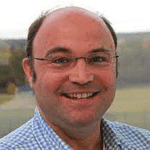Do quantum computers dream of electronic sheep?


Before E-3 Magazine takes its short but well-deserved summer break, a look ahead and back at the same time. Mark Twain is credited with the quote "Forecasts are extremely difficult, especially when they concern the future.
We should keep that in mind when we first look at some quotes that are attributed - not always rightly - to some thought leaders in IT. You know them from lectures, quotes like: "I think there is a world market for maybe five computers" by Thomas Watson, former CEO of IBM, 1943. Or: "640 kB should be enough for everyone" by Bill Gates in 1981.
What both statements have in common is that they have only looked at the current situation in each case and not at the disruption that may arise from the new technology. With the quantum computer, we are perhaps again at the beginning of such a disruption. Decades ago, astonished schoolchildren learned about bytes and bits and how to calculate in binary.
Future generations will understand what quantum bits (qubits) are and how they are used. In short, bits can take on exactly one of these two states with "0" and "1" - not at the same time. Qubits, on the other hand - you guessed it - can assume an infinite number of states. These cannot always be determined with certainty by measurement, so that today the number of results in any number of measurements often determines the most frequent result as the solution.
Furthermore, to stabilize a result, constant environmental variables such as lowest temperatures and the avoidance of any oscillation are still necessary today. You can also get a little closer to quantum computing if you engage in the thought experiment of Schrödinger's cat.
But back to the application possibilities. I remember the time when the SAP founders were still on the board and Hasso Plattner liked to explain to the astonished audience that SAP often developed solutions that were not yet usable at the time due to a lack of powerful hardware.
It always happened that the hardware manufacturers were able to come up with suitable hardware just in time for the release. I was particularly fascinated by his comments to us hardware manufacturers about grid computing. This didn't exist at the time, but came onto the market promptly with rack-based systems, together with operating systems that supported multiprocessors, such as Wolfpack for Windows NT-based systems.
And now quantum computing. Today's classic uses of pure ERP solutions are well covered. But where companies still struggle today are tasks with high complexity.
This includes optimization tasks in logistics and the entire supply chain to calculate optimal warehousing, warehouse positioning, risk minimization, optimal route taking into account many variables and much more. Energetic optimizations in offices and factories or complex simulations of any kind, even in areas such as marketing, are also not yet within reach.
More IT-related topics such as cryptography as encrypted communication or data storage must also be considered. And so we cannot agree with Mr. C. Duell, head of the U.S. Patent Office, who predicted in 1899: "Everything that can be invented has already been invented."
I think it is important that we all deal with the coming possibilities of quantum computing, because besides the technical challenges that can be fixed, we would otherwise fail due to our own ignorance, namely lack of knowledge, lack of vision, and lack of experts.
Then, 120 years later, he would still have been right when, in 1901, the great automobile pioneer Gottlieb Daimler said: "Global demand for motor vehicles will not exceed one million - if only for lack of available chauffeurs."






